How to deal with bladder cancer recurrence? Carbon ion therapy accurately targets tumors, safeguarding patients' quality of life.
How to deal with bladder cancer recurrence? Carbon ion therapy accurately targets tumors,
safeguarding patients' quality of life.
Bladder cancer is the most common malignant tumor of the urinary system, with the highest incidence among urological malignancies. It is often called a "fortunate tumor" because symptoms typically appear early, allowing most patients to be diagnosed and treated at an initial stage with generally favorable outcomes. However, not all patients are so lucky. For those with refractory recurrent bladder cancer, radical cystectomy (complete bladder removal) often becomes the last resort—but this means lifelong use of a urostomy bag and a significant decline in quality of life.
Mr. Xu, 55, faced this same dilemma. Yet, through a meticulously planned carbon ion therapy regimen developed by our medical team, he successfully preserved his bladder. One month after treatment, his bladder tumor had significantly shrunk, with only mild side effects!
Clinical History: Multiple Recurrences, Traditional Treatments Exhausted
Mr. Xu was diagnosed with "high-grade urothelial carcinoma of the bladder" in October 2024. Despite undergoing two surgeries and chemotherapy, the tumor recurred in February 2025, invading the right seminal vesicle and ureter. Continuing conventional treatments would likely require radical cystectomy with urinary diversion. However, Mr. Xu strongly desired to preserve bladder function and declined aggressive surgery.
Key Challenges
● Complex Tumor Location: Invasion of the seminal vesicles and involvement of the ureteral orifice/posterior bladder wall made complete surgical resection difficult.
● Poor Tolerance to Prior Chemotherapy: Significant side effects included bone marrow suppression, ureteral dilation, and renal impairment.
Breakthrough Solution: Carbon Ion Therapy—Precision, Efficacy, and Organ Preservation.
To maximize bladder function preservation, our team designed a combined regimen of carbon ion radiotherapy with reduced-dose chemotherapy (GC regimen).
Carbon Ion Treatment Plan
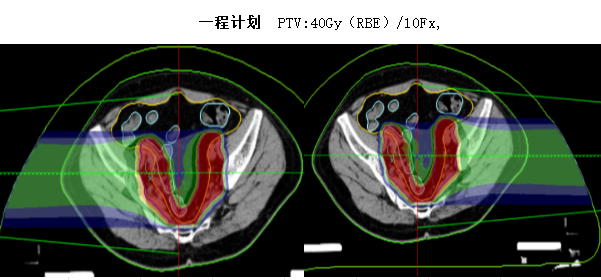
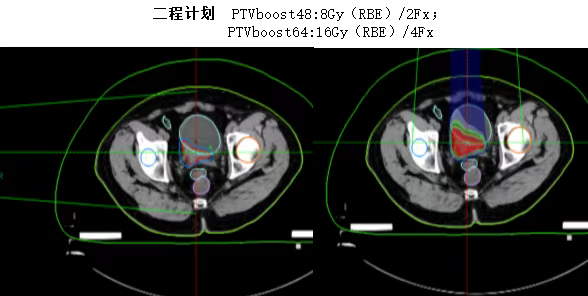
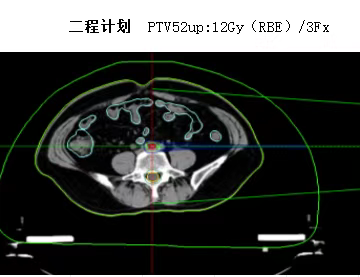
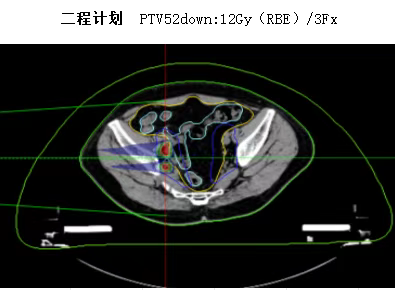
Three Core Advantages of Carbon Ion Therapy
✅ Precise Tumor Targeting with Tissue Preservation
● Utilizes the Bragg peak effect to deliver high-dose radiation precisely to the tumor while minimizing exposure to surrounding organs (e.g., intestines) .
● Significantly lower toxicity compared to conventional radiotherapy: Only Grade 2 urinary frequency and dysuria (mild) and minimal radiation enteritis occurred during treatment.
✅ Rapid and Marked Efficacy: Tumor Regression within 1 Month
● Partial response (PR) achieved at the 1-month post-treatment assessment, with dramatic reduction in tumor metabolic activity and significant alleviation of right ureteral obstruction.
● Image comparison available.
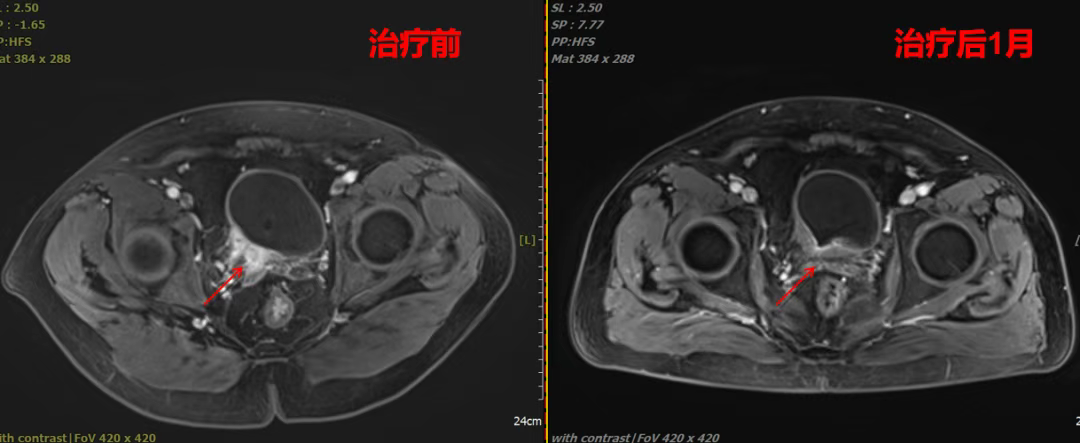
✅ Successful Bladder Preservation with No Compromise on Quality of Life
● Avoids urinary diversion (e.g., ileal conduit), allowing normal urination and uninterrupted social life.
● Mr. Xu expressed: "Now I feel completely like a normal person!"
Expert Insights: Advantages of Carbon Ion Therapy for Bladder Cancer
1. Alternative for surgically challenging tumorsIdeal for tumors in the bladder posterior wall invading critical structures (ureteral orifice, seminal vesicles, prostate) where complete resection is difficult.
2.Hope for chemotherapy-intolerant patientsSafer for those with poor bone marrow function or renal impairment due to minimal systemic toxicity.
3.Superior long-term quality of lifeStudies show significantly better physical/mental health scores in bladder-preserved patients versus those undergoing radical cystectomy.
Patient Update: Return to Normal Life
Mr. Xu currently undergoes regular follow-ups with stable tumor control and preserved urinary function. He has resumed daily work and light exercise.
【Conclusion】
The goal of bladder cancer treatment extends beyond survival—it must safeguard quality of life! Carbon ion therapy offers a new paradigm for recurrent/locally advanced patients: organ preservation, low toxicity, and high efficacy.
Department of Radiation Oncology VI – Heavy Ion Therapy Specialty
Pancreatic Cancer Heavy Ion Therapy Center | Abdominopelvic Tumor Heavy Ion Therapy Unit
Department Overview
Department of Radiation Oncology VI is a specialized center for heavy ion therapy in pancreatic cancer and abdominopelvic tumors (including liver cancer, colorectal cancer, and prostate cancer), offering both heavy ion and photon radiotherapy. Since its establishment, pancreatic cancer patients from across China have sought treatment here, benefiting from precise, painless, non-invasive tumor eradication.
To date, dozens of pancreatic cancer patients nationwide have been treated, achieving:
✔ 1-year local control rate >90%
✔ Median survival extended from 11 months (conventional therapy) to 19 months
✔ High efficacy and positive patient experience, widely recognized by domestic and international experts.
Expert Team
Our team comprises top-tier graduates from prestigious Chinese medical schools, combining solid theoretical knowledge with extensive clinical experience. Internationally renowned advisors include:Prof. Holger Hofmann (Germany),Prof. Hirohiko Tsujii (Japan),Prof. Yi-Min Jen (Taiwan, China),Prof. Wu Jia-Ming (Taiwan, China). They provide complex case consultations, academic lectures, and clinical rounds. Our physicians have trained at leading heavy ion and photon therapy centers in China, ensuring cutting-edge, personalized treatment plans.
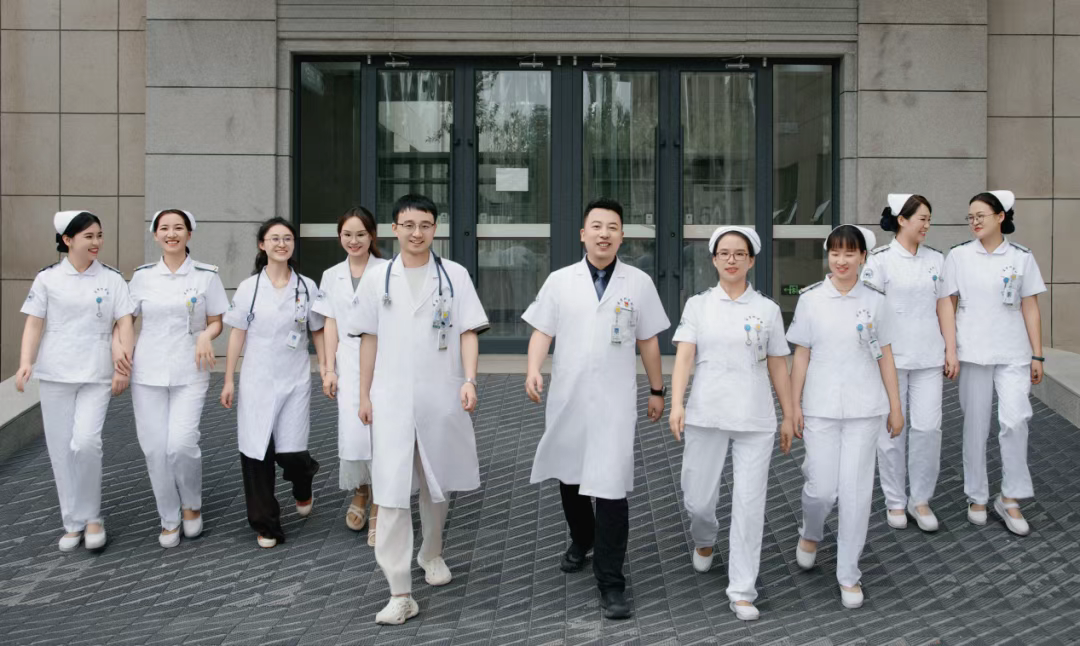
Treatment Scope
Primary focus: Pancreatic cancer heavy ion therapy
Extended services: Heavy ion/photon therapy for liver cancer, colorectal cancer, prostate cancer, and other abdominopelvic malignancies
Comprehensive care: Integrated radiotherapy and individualized oncology management
Featured Specialists

Dr. Chen Weizuo
Deputy Chief Physician & Director, Department of Radiation Oncology VI, Wuwei Cancer Hospital Heavy Ion Center
Honors:
"Luyuan Youth Talent" of Gansu Province
Council Member, Chinese Nuclear Society (Branch of Brachytherapy & Smart Radiotherapy)
Youth Committee Member, Western China Radiotherapy Association
Research:Principal Investigator for 2 provincial talent projects
11 SCI papers, 5 core Chinese journal articles
2 national invention patents (one awarded Gold Medal at the National Invention Exhibition)

Dr. Yin Chaosheng
Former Director, Radiotherapy Department, Xiangnan University Affiliated Hospital (Hunan)
18+ years of oncology experience
Specialties:
Precision radiotherapy (SBRT/SRS)
Head & neck cancer multidisciplinary treatment
Training:
Mentored by Prof. Ren Yi-Min (ex-chair of Taiwan Radiotherapy Society)
Visiting scholar at Tri-Service General Hospital & Chang Gung Memorial Hospital (Taiwan, China)
